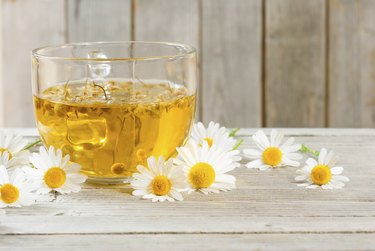
Chamomile tea is a popular, caffeine-free herb tea with a mild taste and pleasant aroma. But although it's relaxing to sip, can it actually lower blood pressure? Here's what you need to know if you're considering adding this tea to your blood pressure management mix.
Read more: 7 Delicious Foods That Can Help Lower Blood Pressure
Video of the Day
Video of the Day
The Upside of Chamomile Tea
Although it would be nice if sipping on chamomile tea produced the same benefits as taking blood pressure medications, there's simply not enough evidence to connect this tea with significant blood pressure benefits, says Sarah Marjoram, RDN, LD, an Atlanta dietitian/nutritionist and founder of Nourish, a nutrition consultancy. However, there may be some effects that help with blood pressure indirectly, she suggests.
Most notably, switching to chamomile tea can be a good way to lower your caffeine intake, Marjoram says. Caffeine can cause a short, but dramatic, increase in blood pressure, according to the Mayo Clinic, so it advises those with high blood pressure to lower their daily consumption or, ideally, find non-caffeinated substitutes. Herbal teas, such as chamomile, can emulate the feeling of having a hot cup of coffee, black tea or green tea, for example, but without the blood-pressure spike.
Another indirect way chamomile tea can help is by increasing your sense of relaxation while lowering anxiety. According to a study published in December 2016 in Phytomedicine, long-term use of chamomile significantly reduced moderate-to-severe generalized anxiety disorder symptoms.
If you have high blood pressure, your doctor suggest ways to control anger and stress, among other strategies for keeping your numbers in check, says Cleveland Clinic. If high blood pressure goes untreated, the clinic adds, you put yourself at higher risk for stroke, heart attack, peripheral vascular disease, kidney failure and other issues.
Although chamomile boasts those indirect blood-pressure effects, the cardiovascular system isn't the only area of the body that can see a boost with this widely available herb. Chamomile has some unique properties that might help your body and mind in other ways, too.
For example, chamomile tea has been associated with better sleep and, although the scientific evidence for that is also scant, it does have contain apigenin, a naturally occurring compound known for its mild sedative effect, according to an October 2015 Journal of Advanced Nursing (JAN) study.
The small JAN trial found that new moms in Taiwan with poor sleep quality experienced at least a short-term improvement in their physical symptoms after drinking one cup of chamomile tea a day for two weeks compared with a control group.
For many people, though, it's the ritual of tea drinking that produces the relaxation effect — for example, wrapping your hands around a warm mug and taking a few moments to slow down and drink it, according to McGill University.
Chamomile’s Downside
Although it's considered very rare, there have been some reports of chamomile allergies, and they tend to occur in people who are allergic to plants in the daisy family, like ragweed.
However, just because you may have a ragweed allergy doesn't mean you must stay away from chamomile. Like any potential allergen, it's best to sample a small amount first and see if you have a negative reaction, advises Ruchi Gupta, MD, MPH, director of the Center for Food Allergy & Asthma Research at the Northwestern University Institute for Public Health and Medicine, a professor at the Feinberg School of Medicine in Evanston, Illinois, and author of The Food Allergy Experience.
Allergic symptoms, she says, tend to include runny nose, itchy eyes, scratchy throat and sneezing. If you're experiencing problems like that, Gupta suggests not finishing your tea and choosing a different option next time.
Another word of caution: The National Center for Complementary and Integrative Health says little is known about whether it's safe to use during pregnancy or while breastfeeding. It also cites potential interactions with the blood thinner warfarin.
The Bottom Line
Whether or not you like to indulge in chamomile tea, remember that managing high blood pressure involves a long-term strategy and regular monitoring.
As the Cleveland Clinic notes, there can be serious repercussions to uncontrolled high blood pressure. Consider lowering your stress over it with a hot cup of chamomile tea, but also make sure to keep your doctor appointments and follow his or her advice for keeping your numbers in line.
- Mayo Clinic: "Caffeine: How Does It Affect Blood Pressure?"
- Sarah Marjoram, RDN, LD, registered dietitian nutritionist, founder, Nourish nutrition consultancy, Atlanta
- Phytomedicine: "Long-Term Chamomile Treatment for Generalized Anxiety Disorder: A Randomized Clinical Trial"
- Cleveland Clinic: "High Blood Pressure (Hypertension): Management and Treatment"
- Ruchi Gupta, MD, MPH, director, Center for Food Allergy & Asthma Research, Northwestern University Institute for Public Health and Medicine, professor, Feinberg School of Medicine, Evanston, Illinois, author, The Food Allergy Experience
- McGill University: "Chamomile Tea, Will You Help Me Sleep Tonight?"
- Journal of Advanced Nursing: "Effects of an Intervention with Drinking Chamomile Tea on Sleep Quality and Depression in Sleep Disturbed Postnatal Women: a Randomized Controlled Trial"
- National Center for Complementary and Integrative Health: "Chamomile"
Is this an emergency? If you are experiencing serious medical symptoms, please see the National Library of Medicine’s list of signs you need emergency medical attention or call 911.